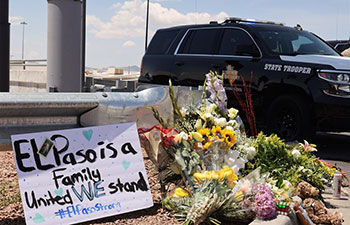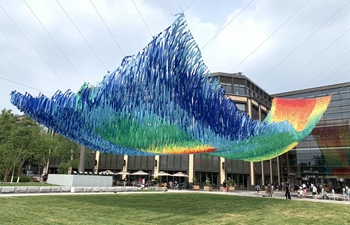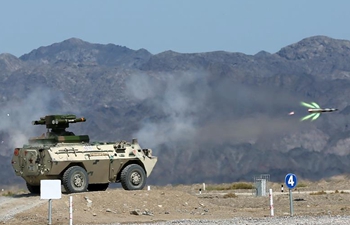
A U.S. national flag flies at half-mast above the White House to mourn for the mass shooting victims in El Paso and Dayton, Washington D.C., the United States, on Aug. 4, 2019. Two mass shootings in the United States left 29 people dead and dozens injured. (Photo by Ting Shen/Xinhua)
by Matthew Rusling
WASHINGTON, Aug. 4 (Xinhua) -- Two U.S. mass shootings over the weekend underscore the problem of gun violence in the United States. But opinions are divided over the causes of the ongoing epidemic, with some pointing to firearms, some to mental health, and others to a combination of several factors.
Two mass shootings occurred less than 13 hours apart this weekend, with 29 people dead and over 50 injured at the time this story was filed in Sunday's evening.
The El Paso shooting occurred in a city situated on the U.S.-Mexico border and left at least 20 dead.
At least three of the dead were Mexican nationals, and U.S. media reported the authorities are treating the tragedy as an act of domestic terrorism.
The shooter may have penned a manifesto that is anti-immigrant before firing, although authorities are looking into whether the document belongs to him.
Across the country in the state of Ohio, another gunman opened fire at a bar district in the city of Dayton, killing nine people and injuring 27 others.
The gunman, a 24-year-old white male, killed nine people including his younger sister, who came to the area with him but separated sometime before the shooting.
While the authorities have yet to determine the motive for the attack, they have confirmed that the firearms the suspect carried were purchased legally.
ILLUSIVE REASONS
The two tragedies are part of a string of ongoing mass shootings that have become all too prevalent in the past decade.
Indeed, the last decade saw four of the deadliest shootings in U.S. history. In 2007, a student at Virginia Tech killed 32 people; in 2012 a deranged gunman entered the Sandy Hook Elementary School and murdered 28 people, many children included; in 2016 a gunman killed 49 people at a gay nightclub in Orlando. And 2017's Las Vegas shooting -- in which nearly 60 people died and 500 were wounded -- dwarfed all three of these incidents in terms of the death toll.
But it remains extremely vague the precise reason for all these mass killings in recent years.
Brookings Institution Senior Fellow Darrell West told Xinhua the ubiquitousness of guns is the "prime problem" behind gun violence.
James Alan Fox, a criminologist at Boston's Northeastern University, who has advised the government on dealing with mass shootings, said stricter background checks could help stem the bloodshed.
"For instance, imposing universal background checks for all gun purchases and limiting concealed-carry permits," Fox wrote in USA Today, speaking of permits that allow people in some U.S. states to carry a gun in their pocket.
Other ideas are "expanding access to mental health services and increasing support for folks going through job termination or marital separation," he said, referring to two very stressful events in many people's lives, which can lead them to behave violently.
Many shooters have underlying mental health issues, and when a major loss occurs in their lives -- such as a job loss or a relationship breakup -- they are unable to cope and lash out with violence.
Such individuals tend to be "very isolated," Joseph A. Toomey, assistant professor and director of the forensic psychology concentration at William James College, told Xinhua. When losses in their lives occur, they "become very angry" and "blame those around them ... or on society."
Some experts argue that the Internet is partially to blame. An isolated, mentally disturbed individual, who commits mass murder because he believes the society has wronged him, knows the Internet will spread news of his crime to the world within hours.
This may have been the issues in 2017 with the "Facebook killer" -- a gunman who carried out a murder and posted a video of the crime on Facebook. Experts said the man felt the world had misunderstood him, and the killer, in his twisted mind, wanted the world to see what the society forced him to do, some experts contended.
NO CHANGES ON THE HORIZON
Gun control is simply not on most voters' radars in the lead-up to the 2020 elections, TV news personality and Republican strategist Ford O'Connell told Xinhua.
Polls that are conducted soon after the mass shooting tend to show an uptick in the number of Americans that believe gun control is a major issue, but those numbers significantly lessen once the shootings are gone from the news cycle.
Generally, only a small percentage of Americans view gun control as a major issue, while healthcare, jobs and immigration top the list of voters' priorities.
Although the Democrats may introduce bills on a national level, experts said they will not go far in a divided Congress.
Instead, the United States is more likely to see laws enacted on a state level rather than on a national level, O'Connell said, adding that the gun control issue will not decide the 2020 election.
On the state level, the legislation conversation has become more robust since last year's Parkland school shooting, in which a gunman killed 17 students and staff. Eight states have passed "red flag laws," allowing for temporary but immediate disarmament of individuals who pose a danger to themselves or others.
Hundreds of firearm-related bills have been introduced at the state and federal level based on a variety of theories about how to keep Americans safe while respecting fundamental constitutional rights, Amy Swearer, a Heritage Foundation senior legal fellow, told Xinhua.
Republicans and Democrats are at odds over the issue. The Democrats are calling for more gun legislation, while Republicans are fearing that more laws might not lessen the violence, but could infringe on rights guaranteed in the U.S. Constitution.
Gun violence is unlikely to change until Democrats hold the House, Senate and the White House, West argued, contending that most GOP lawmakers fail to take action because their constituents favor gun rights and do not want to see restrictions.










